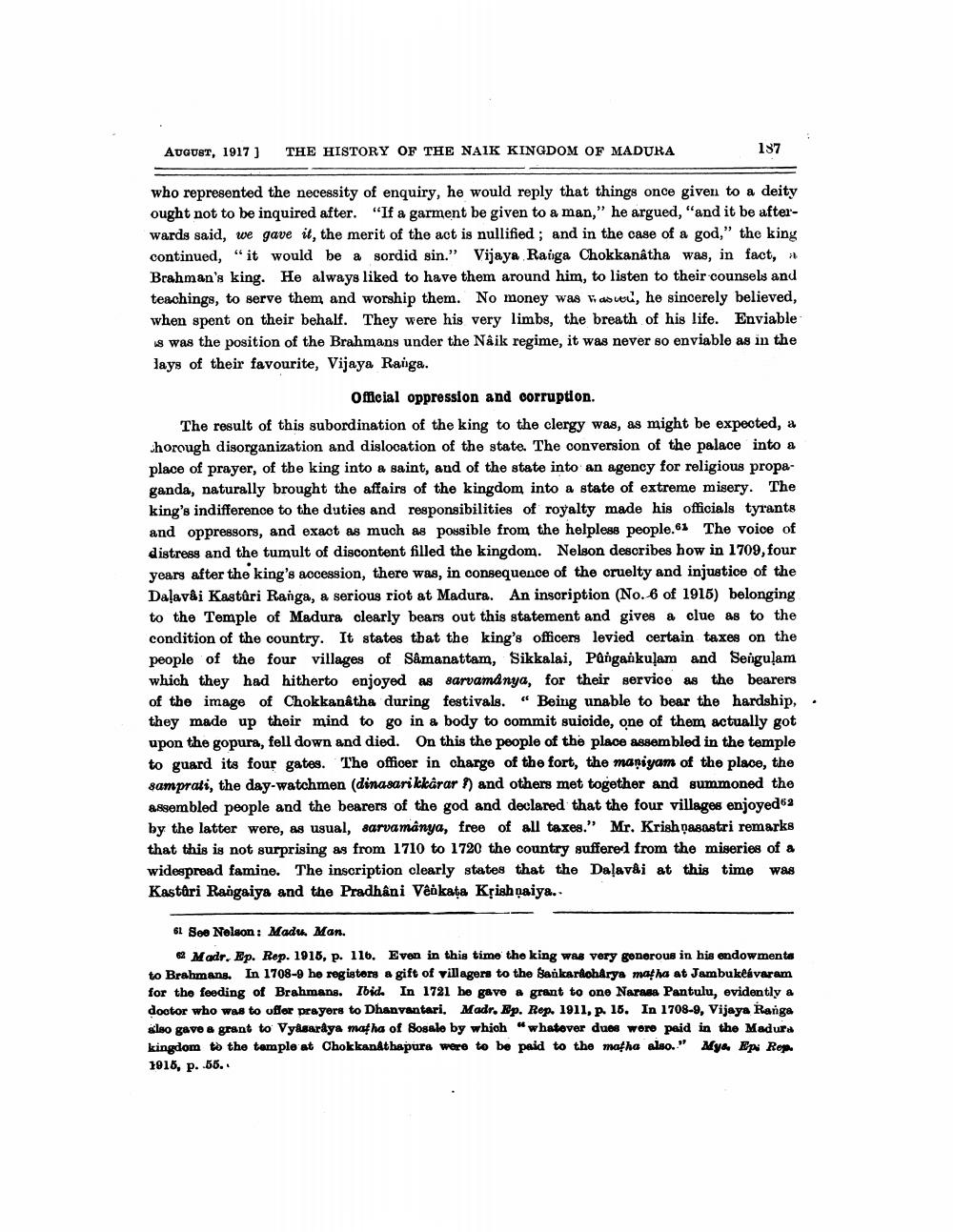________________
AUGUST, 1917)
THE HISTORY OF THE NAIK KINGDOM OF MADURA
137
who represented the necessity of enquiry, he would reply that things once given to a deity ought not to be inquired after. "If a garment be given to a man," he argued, "and it be afterwards said, we gave it, the merit of the act is nullified; and in the case of a god," the king continued, "it would be a sordid sin." Vijaya Ranga Chokkanâtha was, in fact, Brahman's king. He always liked to have them around him, to listen to their counsels and teachings, to serve them and worship them. No money was vias uuu, he sincerely believed, when spent on their behalf. They were his very limbs, the breath of his life. Enviable ws was the position of the Brahmans under the Naik regime, it was never so enviable as in the lays of their favourite, Vijaya Ranga.
Official oppression and corruption. The result of this subordination of the king to the clergy was, as might be expected, a horough disorganization and dislocation of the state. The conversion of the palace into a place of prayer, of the king into a saint, and of the state into an agency for religious propaganda, naturally brought the affairs of the kingdom into a state of extreme misery. The king's indifference to the duties and responsibilities of royalty made his officials tyrants and oppressors, and exact as much as possible from the helpless people.61 The voice of distress and the tumult of discontent filled the kingdom. Nelson describes how in 1709, four years after the king's accession, there was, in consequence of the cruelty and injustice of the Dalav&i Kastüri Ranga, a serious riot at Madura. An insoription (No. 6 of 1915) belonging to the Temple of Madura clearly bears out this statement and gives a clue as to the condition of the country. It states that the king's officers levied certain taxes on the people of the four villages of Samanattam, Sikkalai, Pangankuļam and Senguļam which they had hitherto enjoyed as sarvamanya, for their service as the bearers of the image of Chokkanátha during festivals. “Being unable to bear the hardship, they made up their mind to go in a body to commit suicide, one of them actually got upon the gopura, fell down and died. On this the people of the place assembled in the temple to guard its four gates. The officer in charge of the fort, the maniyam of the place, the samprati, the day-watchmen (dinasari klárar )) and others met together and summoned the assembled people and the bearers of the god and declared that the four villages enjoyed 62 by the latter were, as usual, sarvamanya, free of all taxes." Mr. Krish masastri remarks that this is not surprising as from 1710 to 1720 the country suffered from the miseries of a widespread famine. The inscription clearly states that the Dalavdi at this time was Kastāri Rangaiya and the Pradhâni Venkata Krishqaiya..
61 See Nelson: Madu Man.
62 Madr. Ep. Rep. 1915, p. 116. Even in this time the king was very generous in his endowments to Brahmans. In 1708-9 ho registors a gift of villagers to the SankarlohArya matha at Jambukeavaram for the feeding of Brahmans. Ibid. In 1721 he gave a grant to one Narada Pantulu, evidently a doctor who was to offer prayers to Dhanvantari, Madr. Ep. Rep. 1911, p. 15. In 1708-9, Vijaya Ranga silso gave a grant to Vyasaraya mafha of Sosale by which "whatever dues wore paid in the Madura kingdom to the temple at Chokkanathapura were to be paid to the matha also.." Mya Ep Rep. 1915, p. .55..




